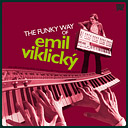Interlude: Vampi Czech-In, part 1
It’s been a long time in the making… Almost two years, to be precise. So, in case you were already wondering what the author of this blog has been doing during the past twelve months, here it is:
On October 5, 2009, Vampisoul Records is releasing the first two compilations conceived, researched, selected, compiled, documented, designed and laid out by yours truly…
Ne! The soul of Marta Kubišová
Vampisoul VAMPI 114 (2LP) + VAMPI CD 114 (CD digipak)

Tracks: Tak dej se k nám a projdem svět, Svlíkám lásku [sample], Já tu s tváří neměnnou, Bílý stůl, Tvůj krém tvůj nůž tvůj růženec (You Came You Saw You Conquered), Kdo ti radu dá, Tajga blues ’69, Hare Krišna (Hare Krishna), Chci právo trubky mít, Legendy, Já cestu k tobě najdu si, Tys bejval mámin hodnej syn, Ne, Jakoby nic, Nepiš dál, Ten zlej páv, Modrej vřes, Zlý dlouhý půst, Ten druhý v nás, Balada o kornetovi a dívce, Na co tě mám, Vrba, Pojďte pejskové, Nejsi sám kdo doufá (Face It Girl It’s Over), Červencové ráno.
Featuring Marta Kubišová with the Golden Kids Orchestra, Mefisto, Waldemar Matuška and others. Twenty of these songs are being reissued on vinyl for the first time.
From our promo material: “Marta Kubišová was the most popular Czechoslovak female singer of the late 1960s, heading for an international career but banned by the communist regime until 1989. Compiled from the Supraphon archives, this 1966–1970 selection focuses on her roughest songs, with plenty of fuzz guitars and funky beats, punchy horns and razor-sharp organs underlying her deep and soulful voice.”
The funky way of Emil Viklický
Vampisoul VAMPI 115 (2LP) + VAMPI CD 115 (CD digipak)

Tracks: Trochu funky (The Funky Way), Týden (Week), Ještě jednou slunce (Once Again Sun), Květen (Maytime), Kam s tím blues (Chega de Saudade), 70. východní (East 70th Street), Boston, Zelený satén (Green Satin), Hromovka (Thunderhouse) [sample], Země plná lásky (A Land Full Of Love) [sample], Zase zapomněli zavřít okno (They’ve Left The Window Open Again), Siesta, Jumbo Jet, Ráno (Part 1 Kash Edit) (Morning).
Featuring Viklický/Frisell/Driscoll/Johnson, Karel Velebný’s SHQ, Eva Svobodová, Energit, Emil Viklický Studio Big Band. All tracks are being reissued on vinyl for the first time, SHQ and Eva Svobodová also for the first time on CD. Four tracks by Emil’s big band are even previously unreleased!
From our promo material: “Emil Viklický is one of the most renowned Czech jazz musicians and composers. This focused-on-funk selection was recorded between 1975 and 1987 in Czechoslovak studios. Be it with the legendary SHQ or with Energit, accompanying Eva Svobodová, conducting a tight studio big band or collaborating with fellow Berklee College students Frisell/Driscoll/Johnson, Emil knows how to funk up his keys all the way through.”
All tracks have been carefully digitally remastered from 24-bit transfers of the original analog master tapes by fellow blogger and “anti-loudness-warrior” Ian Shepherd.
The records should be available in good record stores near you. In case you should have difficulties to obtain them, be it on vinyl or CD, please let me know.
Labels: female vocal, Golden Kids, instrumental, Interlude, Kubišová Marta, Self Czech-In, SHQ, Svobodová Eva, Vampi Czech-In, Viklický Emil






